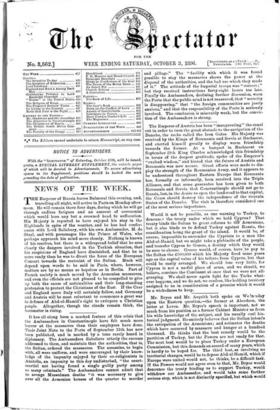It has all along been a marked feature of this
crisis that the Ambassadors in Constantinople have felt much more horror at the massacres than their employers have done. Their Joint Note to the Porte of September 15th has now been published, and is marked by a tone rarely heard in diplomacy. The Ambassadors disbelieve utterly the excuses addressed to them, and maintain that the authorities, that is, the Sultan, ordered the massacres. The assassins, to begin with, all wore uniform, and were encouraged by their know- ledge of the impunity enjoyed by their co-religionists in Anatolia, an impunity to this day undisturbed, "the court- martial not having found a single guilty party among so many criminals." The Ambassadors cannot admit that to avenge Massulman deaths "it was necessary to give over all the Armenian houses of the quarter to murder
and pillage." The "facility with which it was found possible to stay the massacres shows the power at the disposal of the authorities, and the bad use which they made of it." The attitude of the Imperial troops was " correct ; " but they received instructions forty-eight hours too late. Finally the Ambassadors, declining further discussion, warn the Porte that the public mind is not reassured, that "security is disappearing," that "the foreign communities are justly anxious," and that the responsibility of the Porte is seriously involved. The conclusion is miserably weak, but the convic- tion of the Ambassadors is strong.






































